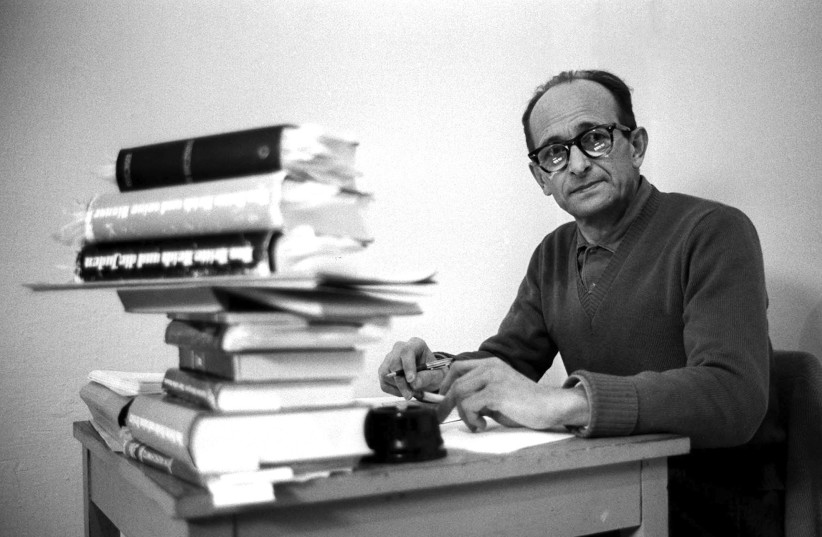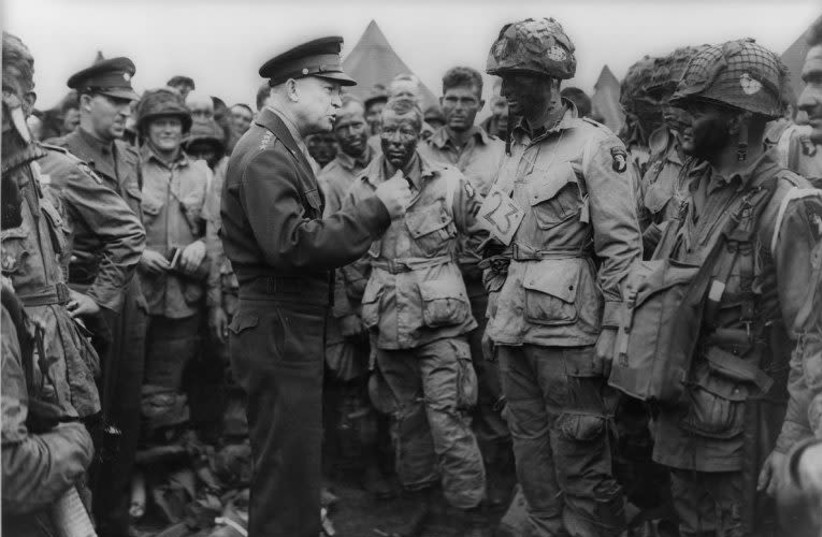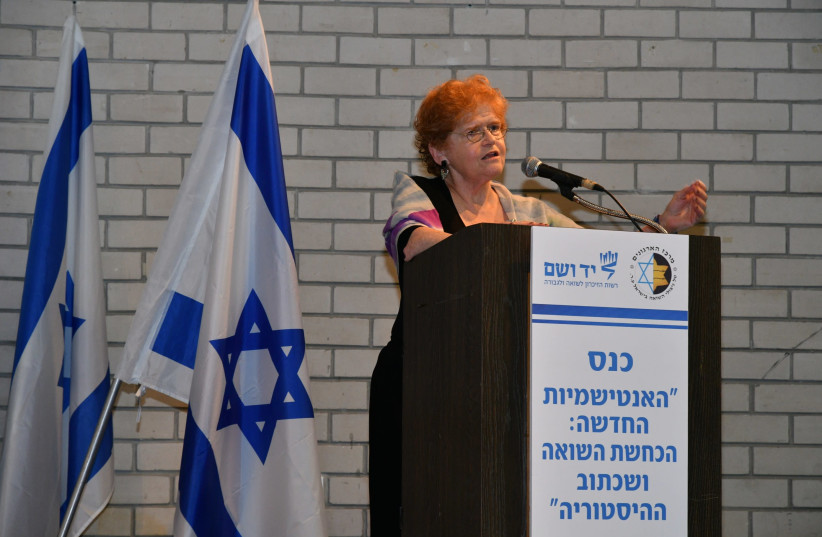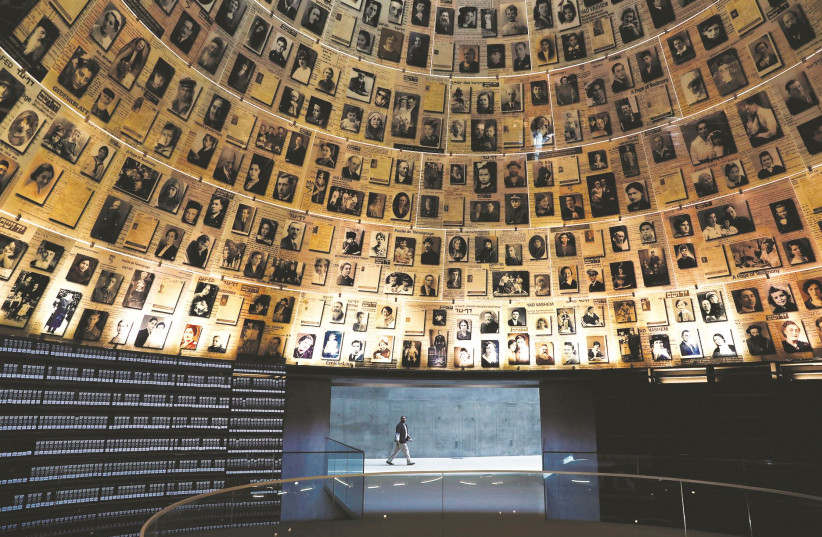There has been interest by a still small number of academically educated, intellectual and political figures willing to participate in Holocaust “revisionism.”
By DANIEL S. GROSS
Published: DECEMBER 4, 2022

NAZI WAR criminal Adolf Eichmann sits at a desk inside his prison cell in Israel, 1961. To mark the 60th anniversary of his execution, KAN 11 aired a new series that brings to light important documentation of Eichmann’s admission of his guilt.
(photo credit: REUTERS)
The US Senate minority leader, Republican Mitch McConnell of Kentucky, has condemned former president Donald Trump for meeting with Nicholas J. Fuentes, a figure described by the Anti-Defamation League as a white supremacist leader rebuked for “jokingly” denying the Holocaust.
McConnell stated that there is “no room in the Republican Party for antisemitism or white supremacy. And anyone meeting with people advocating that point of view, in my judgment, are highly unlikely to ever be elected president of the United States.”
Deflecting such criticism, Trump claims to have never heard of Fuentes before their meeting and that he had no idea about his antisemitic views. This might be true. Nonetheless, charismatic and knowledgeable world leaders inform themselves in advance about such issues before taking any consequential steps.
President Eisenhower anticipated holocaust denial
Scholars have highlighted the fact that prior to his election as president, Republican Dwight D. Eisenhower, while supreme allied commander in Europe and then military governor in Germany, had anticipated future attempts to re-characterize Nazi crimes as propaganda.
To combat such Holocaust denial, he had ordered extensive visual documentation of the death camps, which would immediately be used as evidence of the atrocities for use in the Nuremberg Trials.

General Dwight D. Eisenhower, the Supreme Allied Commander, asked Winston Churchill to send British parliamentarians to Buchenwald.
(credit: NATIONAL LIBRARY OF ISRAEL)
In researching Eisenhower’s legacy as it pertains to Jewish matters, historian Benjamin Runkle has described clearly and at length how “Eisenhower was the primary driver behind the memorialization of the Holocaust.”
The late eminent historian Robert S. Wistrich defined Holocaust denial as “a postwar phenomenon at whose core lies the rejection of the historical fact that six million Jews were murdered by the Nazis during World War II. Alongside explicit repudiation of the Holocaust, denial includes the minimization, banalization and relativization of the relevant facts and events, so as to cast doubt on the uniqueness or authenticity of what happened during the Shoah.”
Not only the work of fringe antisemites anymore
In discussing and warning against Holocaust denial, renowned Israeli historian Yehuda Bauer wrote in depth on the phenomenon known as Holocaust “revisionism.”
He has mapped out the ongoing stubborn process by which many different European, Middle Eastern and American self-proclaimed “experts” try to manipulate and reconstruct the deeds of the Nazis and their helpers. Bauer describes, for example, how some exclaim that rogue agents within the German apparatus are to blame, while others assert that the figures of the tortured and murdered victims have been exaggerated.
Many of these deniers go as far as to argue that the Holocaust did not occur at all and is no more than a Zionist hoax.
In researching Eisenhower’s legacy as it pertains to Jewish matters, historian Benjamin Runkle has described clearly and at length how “Eisenhower was the primary driver behind the memorialization of the Holocaust.”
The late eminent historian Robert S. Wistrich defined Holocaust denial as “a postwar phenomenon at whose core lies the rejection of the historical fact that six million Jews were murdered by the Nazis during World War II. Alongside explicit repudiation of the Holocaust, denial includes the minimization, banalization and relativization of the relevant facts and events, so as to cast doubt on the uniqueness or authenticity of what happened during the Shoah.”
Not only the work of fringe antisemites anymore
In discussing and warning against Holocaust denial, renowned Israeli historian Yehuda Bauer wrote in depth on the phenomenon known as Holocaust “revisionism.”
He has mapped out the ongoing stubborn process by which many different European, Middle Eastern and American self-proclaimed “experts” try to manipulate and reconstruct the deeds of the Nazis and their helpers. Bauer describes, for example, how some exclaim that rogue agents within the German apparatus are to blame, while others assert that the figures of the tortured and murdered victims have been exaggerated.
Many of these deniers go as far as to argue that the Holocaust did not occur at all and is no more than a Zionist hoax.
“Eisenhower was the primary driver behind the memorialization of the Holocaust.”Historian Benjamin Runkle
Of considerable concern, while the original dissemination of such denial has been the work of fringe antisemites, there has been expressed interest by an increasingly, yet still small number, of academically educated, intellectual and political figures willing to participate in this unholy endeavor.
Equally alarming, there has been a call within certain Western, even liberal circles to criticize what they deem a one-sided account of the Holocaust and of Hitler’s regime. Among his many conclusions, Bauer believes that Holocaust denial has been part of a spreading trend due to the incomprehensibility for many of the Holocaust itself.
This lack of comprehension, and need for palpable and acceptable explanations, gives way to the fabrication of the Holocaust’s limited scope, its alleged “true perpetrators,” or even its non-existence.
The words of Bauer and Wistrich resonate still. Local legislatures in Texas have recently drafted and approved House Bill 3979 and its follow-up, Texas Senate Bill 3. These relate to how current events or controversial issues of public policy or social affairs should be discussed in official educational forums and reflected in school curriculums.
The hope of the legislatures is that teachers will “strive to explore such issues from diverse and contending perspectives without giving deference to any one perspective.” On the face of it, it sounds reasonable.

Holocaust expert and historian Deborah Lipstadt speaks at the New Antisemitism, Holocaust denial and rewriting history conference earlier this week
(credit: ISRAEL MALOVANI)
The necessity for educational mediums to confront falsehoods
Unfortunately, the topic of the Holocaust has already been subject to such scrutiny as reported by The Jerusalem Post (“Texas official orders teachers to present ‘opposing’ views on Holocaust,” October 17, 2021).
According to one Jewish educator mentioned in that report, teaching history under such a law would diminish the understanding of Nazi Germany as inherently antisemitic.
Due to the continued necessity for educational mediums in an effort to confront falsehoods regarding the scale, even existence, of the Shoah, numerous multi-episode documentaries are being produced and broadcast on significantly important publicly funded channels.
To mark the 60th anniversary of the execution of Adolf Eichmann, the Nazi official chiefly responsible for implementing the “Final Solution,” KAN 11 aired a new series, Eichmann: The Devil Speaks, by Yariv Mozer, which brings to light important documentation of Eichmann’s admission of his guilt. The series focuses on recordings of interviews between Eichmann and Dutch Nazi journalist Willem Sassen in the late 1950s.
These audio recordings contradict Eichmann’s denials regarding his own involvement at the highest levels of planning and executing Hitler’s plan to wipe out Europe’s Jews.
“We owe the young victims of the Holocaust and atrocities everywhere, our commitment to this understanding.”Principal Linda Hooper
Similarly, the acclaimed American documentarian Ken Burns and his colleagues have also completed a three-episode series titled The U.S. and the Holocaust. Broadcast on PBS, the series examines “America’s response to one of the greatest humanitarian crises of the 20th century” and calls for a reckoning with the possibility that the American nation failed to live up to its ideals as a “nation of immigrants.”
According to these documentarians, “as the catastrophe of the Holocaust unfolded in Europe, the United States proved unwilling to open its doors to more than a fraction of the hundreds of thousands of desperate people seeking refuge.”
Moreover, the series sets to delve “deeply into the tragic human consequences of public indifference, bureaucratic red tape and restrictive quota laws in America.”
In other words, not only are the horrors of the Holocaust undeniable, the lack of adequate responses by the United States may be unjustifiable and are to be lamented.
The late American-Jewish historian Oscar Handlin, noted for his pioneering studies on immigration to the US, once wrote that the use of history “lies in its capacity for advancing the approach to truth.” While remarking on the measure of truth in history, his contemporary Jewish historian Abraham Halkin proclaimed that it is every human’s duty to accept truth as it is revealed, and not as it is fashioned. In today’s climate, both scholars would dismiss any notion of so-called “alternative facts.”

THE HALL of Names at the Yad Vashem World Holocaust Remembrance Center in Jerusalem, April 20, 2020. (credit: RONEN ZVULUN/REUTERS)
Therefore, strategies devised by American educators such as the “Paper Clip Project,” first implemented at Whitwell Middle School in rural Tennessee, are to be commended. Principal Linda Hooper and her team began a Holocaust education class “that would be the basis for teaching tolerance and diversity in a voluntary after-school program. When the students, mostly white and Christian, struggled to grasp the concept and enormity of the six million Jews who died during the Holocaust, they decided to collect six million paper clips – one for each soul who perished.”
Since then, the school also dedicated a Children’s Holocaust Memorial, which includes an authentic German rail car filled with a portion of the more than 30 million paper clips they eventually collected. Most recently, Hooper has been vocal in her response to the attempted removal of Pulitzer Prize-winning books regarding the Holocaust from the curriculum by her county’s school board.
Her endeavors were designed to help young students “engage as global citizens” and to understand that we must respect the differences between people. “I wanted them to learn what happens when we don’t fully recognize the humanity of people from different ethnic backgrounds and cultures.”
In doing so, Hooper explains that “we owe the young victims of the Holocaust and atrocities everywhere, our commitment to this understanding.” Hopefully, thanks to the hard work of scholars, the skilled art of the documentarians, and passion of humanitarian educators, no Americans will choose to be complicit in the extermination of the memory of the victims.
The writer is a postdoctoral fellow at the Annenberg Center for American Studies at the Faculty of the Humanities, The Hebrew University in Jerusalem.
Therefore, strategies devised by American educators such as the “Paper Clip Project,” first implemented at Whitwell Middle School in rural Tennessee, are to be commended. Principal Linda Hooper and her team began a Holocaust education class “that would be the basis for teaching tolerance and diversity in a voluntary after-school program. When the students, mostly white and Christian, struggled to grasp the concept and enormity of the six million Jews who died during the Holocaust, they decided to collect six million paper clips – one for each soul who perished.”
Since then, the school also dedicated a Children’s Holocaust Memorial, which includes an authentic German rail car filled with a portion of the more than 30 million paper clips they eventually collected. Most recently, Hooper has been vocal in her response to the attempted removal of Pulitzer Prize-winning books regarding the Holocaust from the curriculum by her county’s school board.
Her endeavors were designed to help young students “engage as global citizens” and to understand that we must respect the differences between people. “I wanted them to learn what happens when we don’t fully recognize the humanity of people from different ethnic backgrounds and cultures.”
In doing so, Hooper explains that “we owe the young victims of the Holocaust and atrocities everywhere, our commitment to this understanding.” Hopefully, thanks to the hard work of scholars, the skilled art of the documentarians, and passion of humanitarian educators, no Americans will choose to be complicit in the extermination of the memory of the victims.
The writer is a postdoctoral fellow at the Annenberg Center for American Studies at the Faculty of the Humanities, The Hebrew University in Jerusalem.
Hannah Arendt's Original Articles on "the Banality of Evil" in the New Yorker Archive | Open Culture
.jpg)
No comments:
Post a Comment